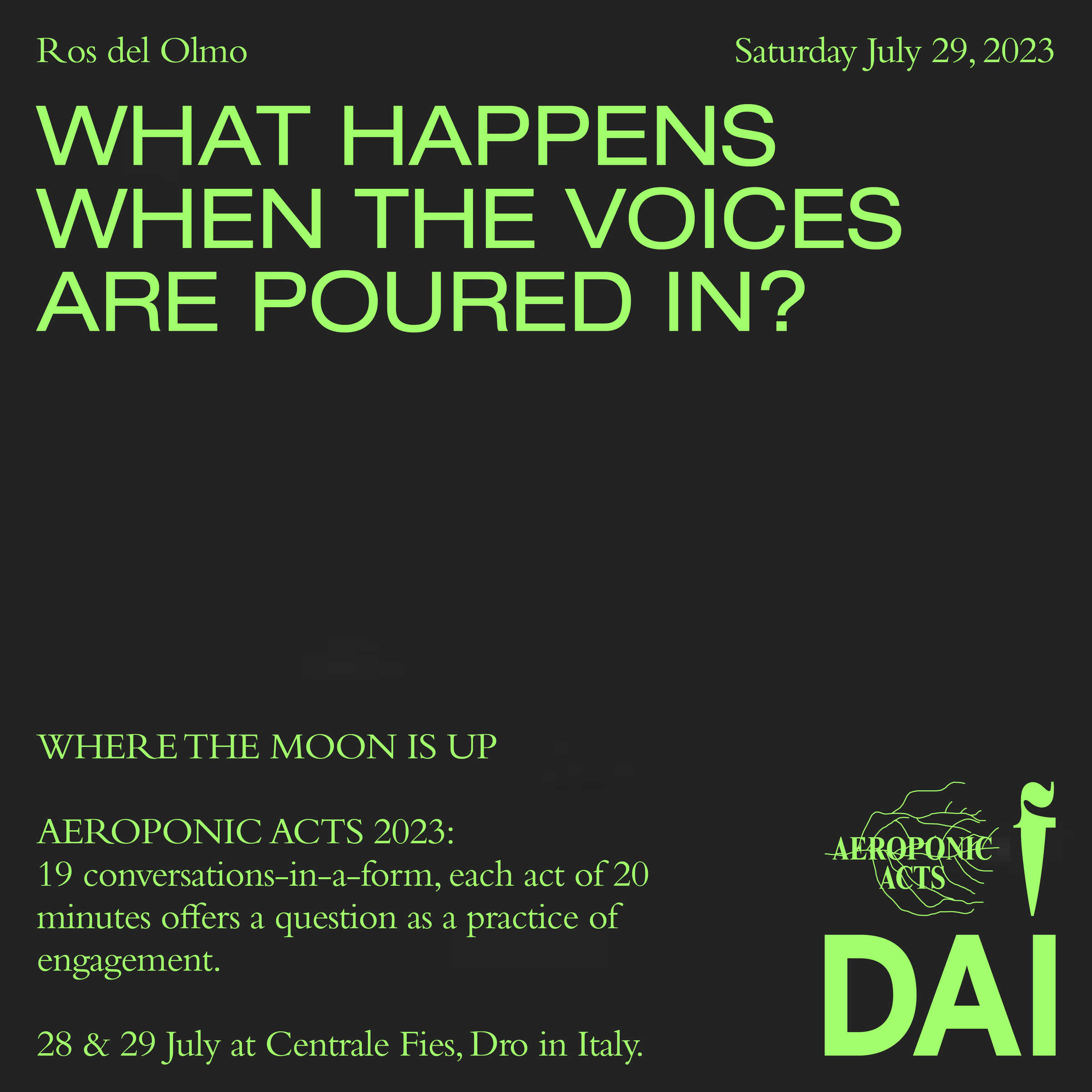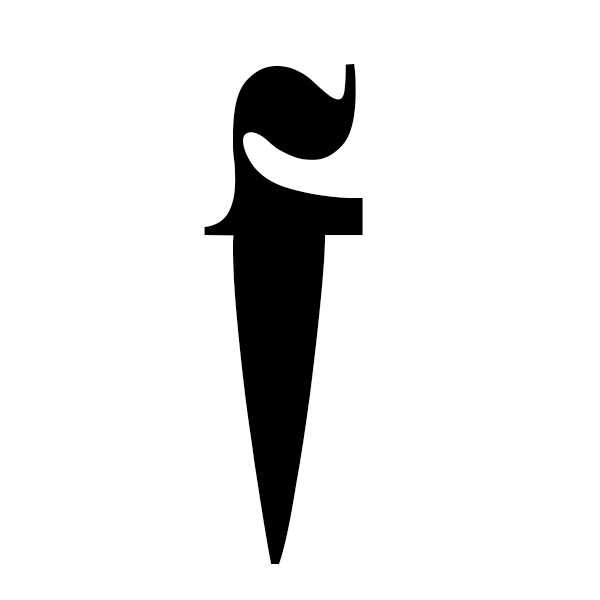Ros del Olmo ~ A chamber for the softest thing
Ros del Olmo's "A chamber for the softest thing" was presented before live audience at Centrale Fies, Dro, Italy on July 29th, 2023 as one of 19 AEROPONIC ACTS of WHERE THE MOON IS UP curated by Elisa Giuliani.
Here you will find the documentation of Ros del Olmo's presentation as filmed by Baha Görkem Yalım. The written report is by Giulia Crispiani and it includes a summary of the comments by esteemed guest respondents.
A chamber for the softest thing
Ros del Olmo's question: What happens when the voices are poured in?
Ros' introduction: Between the teeth, a chamber for the softest thing. A room for reading together wears voices as a non conventional liquid. It does not host, does not gate-keep the excess of intonation of speaking tongues on the cool floor next to the sink. Then the sun deeply orange and pink goes silent about its aquantancies of what leaks over. Miss-spelling the room in any case. Like a mouth sometimes takes air in; like a music box; an inverted tree (a tongue tree) turned into a tablecloth for a shared non-orthogonal space. "Maybe a tongue is also a key", Ocean says (a note on the fridge about the poetical possibilities of "would you let me in?" of "do you want a glass of water?"). Your letters, your letters that arrive first and the sound of the rings left on the small table: Solo somos este ramo de ramas.
Giulia's report: A large flag is hanging with an embroidery, drawings are hung on the window and in the backdrop, the audience is scattered around. Some colorful plastic cases for dentures are hanging from the ceiling on some metal chains, several mics are laying on the ground. A sound is looping, a performer is blowing in a bottle, and other voices are making other very subtle sounds. Two performers walk toward the mics and take their shoes off. Take the mics off the stands and place them closer to the sounds sources. A voice whispers something we can’t hear, reads a text in first person, behind the curtain, then stands up and goes to a friend who’s inviting everyone to join a writing exercise, the first word is “tree” and everyone has some time to write. There are pens and papers scattered around. Everyone is writing silently. The second word is “tongue”. They say “time” to start and “time” to stop. When time is due the performers stand up and read from people’s hands what’s been written. Then they lay on each other in the middle of the room, and tell what they remember, or random thoughts—“I love creme brûlée”, One stands up and whispers and repeats a sentence in Spanish, and shouts. Then they all stands up and go drink water and all sigh from hydration, then read over each other, in a sort of cacophony. Then conjoin in a sentence, then part in different content and language then rejoin—“dyky practice, floating kinship” as a sort of prayer. Then offer some water to the ancestors and sip together and hug. There were scores and papers scattered on the floor, for the audience to grab.
Phanuel Antwi This was between collaborative sound making and the religious practice of speaking in tongues. In the anatomical function of vocalizing, not knowing the language I was less interested on the meaning of it and I focused more on the sound, and engaged with the body whistle, in the wrapping of your lips—the physics of sound. The chamber is inside and the bottle is outside, the tongue to be this instrument not only of speech but a musical instrument depending on how one uses it. The verbal behavior when we speak, which is in the tongue—as they say “if you want to learn a language, find a lover.” Something quite magical also.
Ayesha Hameed Its’ so wise to do this performance in this space, being elevated and coming to light (Comando) the room was a character in itself. We’re at the presence of sorcerers doing a spell. There’s a certain South American sensibility around animism. You chose your question—it’s exactly what you’re doing, you made a chamber. A paper with prompt a delicate reminder, we hear this incantation. The score has been written and rewritten so gently. I feel it’s a text you wrote and then you meditated and is something very much in process—a queer genealogy which is made and broken and remade. There’s a lot of small details. You take us inwards and outwards, you feel like your in the tree with the breezes. Not religious spirituality that deals with rituals and gentleness. Thinking of the violence of the binary outside—it’s a healing set of rituals. You tuned us. What I wrote on this is something I want to keep. Something you generated that was a gift to all of us.
Francesco Urbano Ragazzi This felt like a congregation, versus other congresses with water on the table. You try to turn this collective reading and writing into a non-simplicistic congress. You do this by turning this collectivity into a musical instrument. There’s trust for the meaning and for words.
What is a sign? I was attracted by all these signs I was detached from. I couldn’t see the drawings. The use of the voice reminded me of the forth wave of feminism, resisting against meaningful language, written vs abstract language. They started to focus on the power of voice—Luce Irigaray wrote a book on breathing, Julia Kristeva wrote extensively on the semiotic symbolic order delivered through tones, and Adriana Cavarero’s “For More than One Voice: Toward a Philosophy of Vocal Expression”. Against the philosophy of language. The experience of language that came from motherhood. Tunes and tones rather than meaning.
About Ros del Olmo
Rod del Olmo's "A chamber for the softest thing" was presented before live audience at Centrale Fies, Dro, Italy on July 29th.
Find the overview of all nineteen AEROPONIC ACTS 2023 here: WHERE THE MOON IS UP
In italiano:
TITOLO: Una camera per la cosa più soffice
DOMANDA: Cosa succede quando le voci vengono versate?
Tra i denti, una camera per la cosa più soffice. Una stanza per leggere insieme le voci come un liquido non convenzionale. Non ospita e non custodisce l'eccesso di intonazione delle lingue parlanti sul pavimento freddo accanto al lavandino. Poi il sole, profondamente arancione e rosa, tace sulle lacune di ciò che trapela. In ogni caso, la stanza non si pronuncia bene. Come una bocca che a volte prende aria; come un carillon; un albero rovesciato (un albero della lingua) trasformato in una tovaglia per uno spazio condiviso non ortogonale. "Forse una lingua è anche una chiave", dice Ocean (una nota sul frigorifero sulle possibilità poetiche di "mi fai entrare?" o "vuoi un bicchiere d'acqua?"). Le tue lettere, le tue lettere che arrivano per prime e il suono degli anelli lasciati sul tavolino: Solo somos este ramo de ramas.


